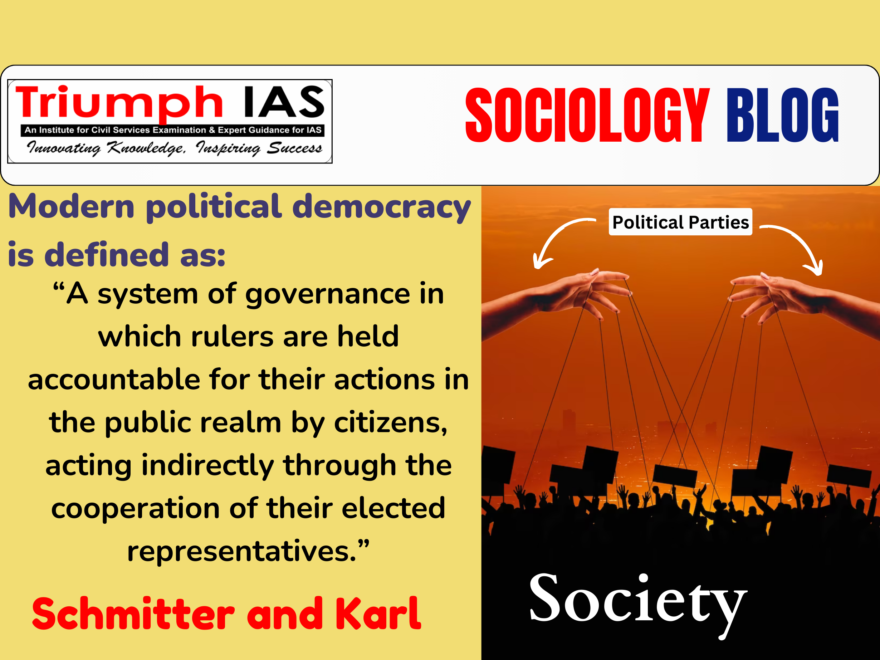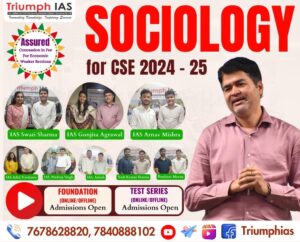How is civil society useful in deepening the roots of democracy?
Section: A.
Sociology Paper 2023 Analysis.
Relevant for Paper-1 : Politics and Society
Question- 5 (B): How is civil society useful in deepening the roots of democracy?
(10 Marks)
|
Introduction: Explain the term civil society along with its drawing its relationship with democracy Main Body: Explain the functional role played by civil society in strengthening democracy; explain the alternate view in brief Conclusion: On the lines of civil society can be a means to good ends, but it is not the end itself |
Introduction:
Civil society is a term that refers to the social organisations and institutions that operate outside of the government and the market. These can include non-governmental organisations (NGOs), community groups, religious organisations, labour unions, and other voluntary associations. Civil society plays a crucial role in deepening the roots of democracy by fostering active citizen participation, promoting democratic values, holding governments accountable, and providing a platform for social and political change.
Main body:
- Limit the state power: Diamond’s view, civil society performs the function of limiting the state power; by checking its political abuses and violations of the law and subjecting them to public scrutiny. Diamond maintains, “A vibrant civil society is probably more essential for consolidating and maintaining democracy than initiating it.”
- Promotion of Active Citizen Participation: One of the key ways in which civil society deepens the roots of democracy is by promoting active citizen participation. Civil society organisations often act as a bridge between citizens and the government, facilitating dialogue and engagement. They provide citizens with a platform to voice their concerns, engage in policy discussions, and influence decision-making processes.
-
- For example, in India, the Right to Information Act (2005) was largely a result of the efforts of civil society organisations like the Mazdoor Kisan Shakti Sangathan (MKSS).
-
- Promotion of Democratic Values: Larry Diamond in his article, ‘Rethinking Civil Society’ (1996), says, “Civil society plays a significant role in building and consolidating democracy.” Civil society organisations play a crucial role in promoting democratic values such as equality, justice, and respect for human rights. They educate citizens about their rights and responsibilities, promote tolerance and pluralism, and combat discrimination and exclusion.
-
- For instance, organizations like the People’s Union for Civil Liberties (PUCL) in India have been instrumental in advocating for human rights and civil liberties.
-
- Public policy inputs: Dr. Jan Aart Scholte highlights that government policy formulation is considerably influenced from the inputs given by the civil society not only at home but also in the international arena. For example, civic groups have been pioneer in sparking debate about the so-called ‘Washington Consensus’.
- A well founded civil society could act as a shock observing institution, where wide range of interests that may cross-cut and mitigate the principal polarities of political conflict.
- Accountability and Transparency: Alfred Stepan in his work, Problems of Democratic Transition and Consolidation (1996), states that among the basic requirements for democracy “is the opportunity to formulate preferences, to signify preferences, and to have these preferences weighted adequately in the conduct of government. “In this context Civil society organisations play a watchdog role, holding governments accountable and ensuring transparency in their operations. They monitor government actions, expose corruption, and demand accountability.
-
-
- For instance, the Association for Democratic Reforms (ADR) in India has been working towards improving governance and strengthening democracy by focusing on electoral and political reforms.
-
- Legitimacy—the sum total of the preceding actions by the civil society could lead to a legitimate democratic rule. Legitimate rule prevails when people concede that an authority has a right to govern and that they have a duty to obey its directives.
- Platform for Social and Political Change: Civil society provides a platform for social and political change. It allows for the mobilization of social movements and campaigns that can lead to significant policy changes.
- For instance, the Indian anti-corruption movement led by Anna Hazare in 2011, which was supported by various civil society organizations, resulted in the passing of the Lokpal and Lokayuktas Act in 2013.
Alternate view of role of civil society:
- Civil society activities may not essentially pursue democratic purposes. Though the term civil society at the outset seems to convey elements of civility and virtue, but in practice, voluntary associations do not ipso facto have the promotion of democracy on their agenda. On the contrary, elements of such organisations may engage themselves in subverting democracy.
-
- For example, some civic organisations can work to promote their private petty interests and privilege For instance Muslim Brotherhood, have not pushed for democracy in a comprehensive fashion.
-
- Civil society might draw away from democracy if its efforts are poorly planned and designed or executed—if the said activists function without understanding the institutional arrangement of governance, they could cause real harm to the very objectives of their organisation.
- Concerns about global democracy from civil society organizations can sometimes disregard or be insensitive to local cultural practices. This insensitivity may result from a lack of understanding of the local context and population.
- Civil society may lack internal democracy. Civil society groups -including those that specifically campaign for greater democracy, can fall short of democratic behaviour in their own functioning. A lack of internal democracy within civil society circles is not only objectionable in itself, but also contradicts its very goal of bringing democracy to society at large.
Conclusion:
Civil society can be a means to good ends, but it is not the end itself. There are circumstances where civic involvement may detract from democracy or sabotage the very fabric of democracy. It should be the first demand of the society that civic associations should not merely assert but also demonstrate their democratic legitimacy. The effectiveness of civil society in deepening democracy also depends on the political and legal environment in which it operates. Therefore it is essential to create an enabling environment that allows civil society to function effectively and contribute to the deepening of democracy.
Related Blogs…
To master these intricacies and fare well in the Sociology Optional Syllabus, aspiring sociologists might benefit from guidance by the Best Sociology Optional Teacher and participation in the Best Sociology Optional Coaching. These avenues provide comprehensive assistance, ensuring a solid understanding of sociology’s diverse methodologies and techniques.
META TAGS:
Iron Law of Oligarchy, Robert Michels, Vilfredo Pareto, Lions and Foxes theory, power dynamics, organizational oligarchy, elite circulation, political sociology, leadership styles, organizational control, sociological theories, political maneuvering, elite differentiation, power concentration, societal stability, political leadership, strategic political leadership, Sociology Question Paper, Sociology Question Paper 2023, Sociology Question Paper CYQ, Sociology Question Paper UPSC, What, according to Robert Michels, is the iron law of oligarchy? Do lions and foxes in Vilfredo Pareto’s theory, essentially differ from each other? Substantiate.
Why Vikash Ranjan’s Classes for Sociology?
Proper guidance and assistance are required to learn the skill of interlinking current happenings with the conventional topics. VIKASH RANJAN SIR at TRIUMPH IAS guides students according to the Recent Trends of UPSC, making him the Best Sociology Teacher for Sociology Optional UPSC.
At Triumph IAS, the Best Sociology Optional Coaching platform, we not only provide the best study material and applied classes for Sociology for IAS but also conduct regular assignments and class tests to assess candidates’ writing skills and understanding of the subject.
Choose The Best Sociology Optional Teacher for IAS Preparation?
At the beginning of the journey for Civil Services Examination preparation, many students face a pivotal decision – selecting their optional subject. Questions such as “which optional subject is the best?” and “which optional subject is the most scoring?” frequently come to mind. Choosing the right optional subject, like choosing the best sociology optional teacher, is a subjective yet vital step that requires a thoughtful decision based on facts. A misstep in this crucial decision can indeed prove disastrous.
Ever since the exam pattern was revamped in 2013, the UPSC has eliminated the need for a second optional subject. Now, candidates have to choose only one optional subject for the UPSC Mains, which has two papers of 250 marks each. One of the compelling choices for many has been the sociology optional. However, it’s strongly advised to decide on your optional subject for mains well ahead of time to get sufficient time to complete the syllabus. After all, most students score similarly in General Studies Papers; it’s the score in the optional subject & essay that contributes significantly to the final selection.
“A sound strategy does not rely solely on the popular
Opinion of toppers or famous YouTubers cum teachers.”
It requires understanding one’s ability, interest, and the relevance of the subject, not just for the exam but also for life in general. Hence, when selecting the best sociology teacher, one must consider the usefulness of sociology optional coaching in General Studies, Essay, and Personality Test.
The choice of the optional subject should be based on objective criteria, such as the nature, scope, and size of the syllabus, uniformity and stability in the question pattern, relevance of the syllabic content in daily life in society, and the availability of study material and guidance. For example, choosing the best sociology optional coaching can ensure access to top-quality study materials and experienced teachers. Always remember, the approach of the UPSC optional subject differs from your academic studies of subjects. Therefore, before settling for sociology optional, you need to analyze the syllabus, previous years’ pattern, subject requirements (be it ideal, visionary, numerical, conceptual theoretical), and your comfort level with the subject.
This decision marks a critical point in your UPSC – CSE journey, potentially determining your success in a career in IAS/Civil Services. Therefore, it’s crucial to choose wisely, whether it’s the optional subject or the best sociology optional teacher. Always base your decision on accurate facts, and never let your emotional biases guide your choices. After all, the search for the best sociology optional coaching is about finding the perfect fit for your unique academic needs and aspirations.
Follow us :
🔎 https://www.instagram.com/triumphias
🔎 https://www.youtube.com/c/TriumphIAS
🔎 https://t.me/VikashRanjanSociology
Find More Blogs…
| Compare and contrast Karl Marx’s and Max weber’s | Karl Marx- Historical Materialism |
| Position of Women In the Modern Indian Society | Sociology: Social system and pattern variables |
KEYWORD:
Cultural pluralism,Cultural pluralism,Cultural pluralism, Cultural pluralism, Cultural pluralism


